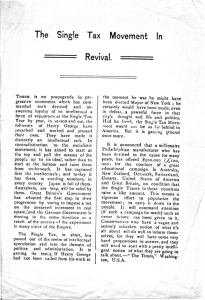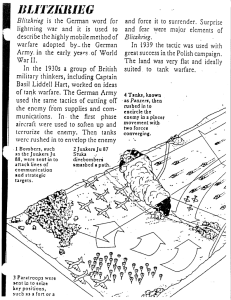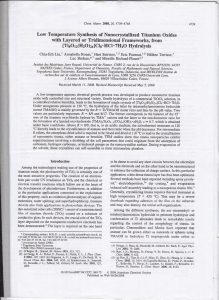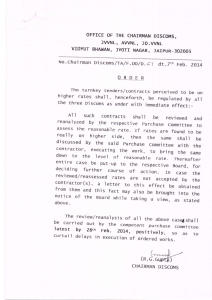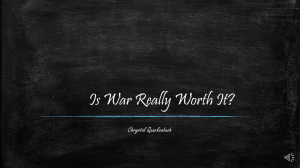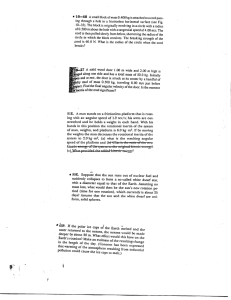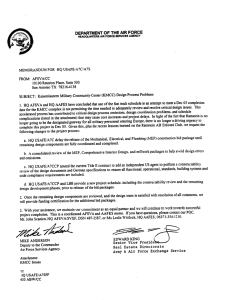CHILL A SLMVI TR With a quiet, but independent,
advertisement
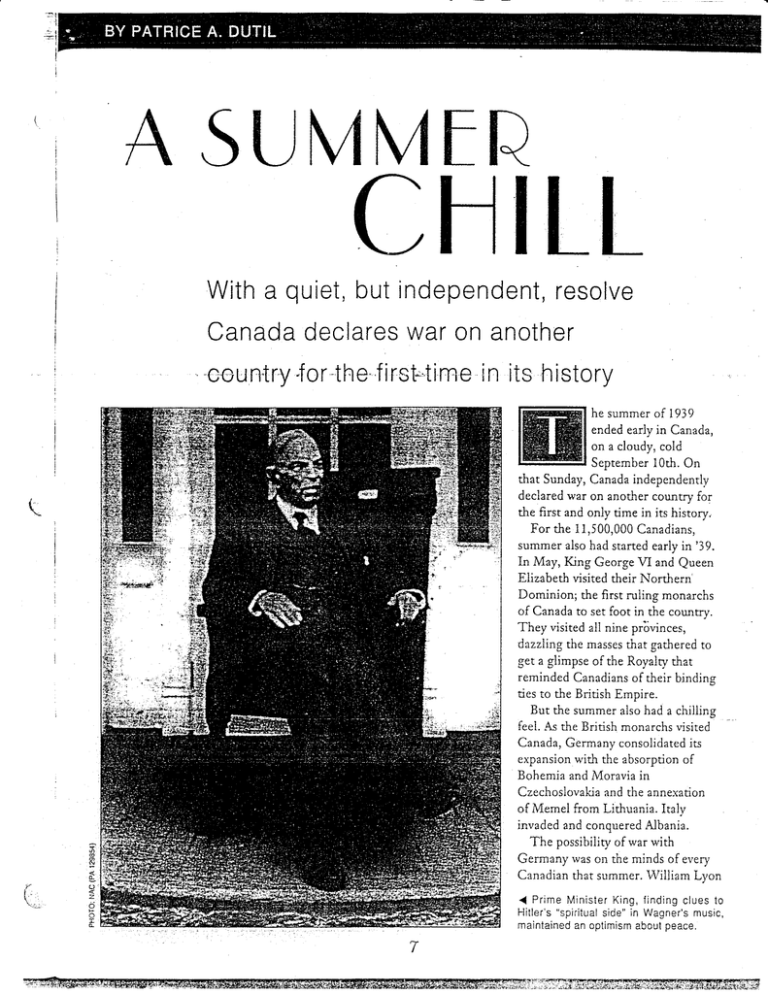
A SLMVI TR
CHILL
With a quiet, but independent, resolve
Canada declares war on another
countr"y"for the'first-tir"ne in its history
he summer of 19i9
ended early in Canada,
on a cloudy, cold
September 10th. On
that Sunday, Canada independenrly
declared war on another country for
the first and only rime in its history.
For the i 1,500,000 Canadians,
summer also had started early in '39.
In May, King George VI and Queen
(
Elizabeth visited their Norrhern'
Dominion; the first ruling monarchs
of Canada to set foot in the couatry.
They visited all nine priivinces,
dnzling the
masses that gathered to
get a glimpse of the Royalw that
reminded Canadians of their binding
ties to the Brirish Empire.
But the summer also had a chilling
feel. fu the British monarchs visired
Canada, Germany consolidated its
expansion with the absorption of
Bohemia and Moravia in
Czechoslovakia and the annexarion
of Memel from Lithuania. Itaiy
invaded and conquered Albania.
The possibiiigv of war with
Germany was on the minds of every
Canadian that summer. William Lyon
c
t:
\'
z
< Prime Minister King, finding clues to
Hitler's "spiritual side" in Wagner's music,
I
maintained an optimism about peace.
7
l;ffi
#ffi
becomes intelligible. It is that
which makes this appeal to his
good, his spirirual side, important."
King, hoping for peace like all
Canadians, was relieved when he
heard in late August i919 rhat
Russia and Germany had signed a
Depression. A-Fter ten years of
economic decline and stagnarion,
Canadians were divided and angnr.
Unemployment before the
depression had hovered around rhe
3% mark, but by 1933 the
unemploymenr rate in Canada
hovered benveen lgYo and27"/o.
The economy began to improve
after rhe first quarter of 1933, bur
pact of friendship. If Hider wished
to fulfiIl his wish of acquiring parts
of Poiand, this would be the
moment to suike. But King
remained firm in his delusions: "I
have never felt this to be his aim,"
he wrote in his diary. Mackenzie
u
=
z
F
A Queen Elizabeth was surrounded by
admir!ng First WorlC $Jar veterans dur=
ing the 1939 Royal Visit.
Mackenzie King, the 65-year-old
prime minisrer of Canada,
redoubled his oprimistic efforts to
find hope for peace.
He had rner Hider in 193 7 and
left Germany convinced that the
Fuhrer rvas a man of peace, noting
in his diary that Hitler "impressed
me as a man of deep sinceriry and a
-.-
King was desperate to find silver
linings in the darkest clouds.
Canada was not prepared for war,
but he feared that its moral and
sentimental obligations to Great
Britain couid ensnare it in another
divisive conflict.
In rhe srunmer of 1939, Canada
had not yet recovered from the
The declaratinn 0f
by 1934, 2 million Canadians
received public relief at some dme,
and 1.9 million u'ould during 1935.
in 1938 rhe number was still in
excess of I.l miliion. The
unemplol'ment, the desperation and
the dust-bou,l conditions of the
western prairies made the 1930s
Canada's darkest time in this
cenrLrry.
The Depression had propelled the
consoiidation of protest movements
and the creation ofnew parties.
uar,
independently) rras
both crazed and wise and opened r
new chapter
in the history of Canada
t-i ^* tt
ya u tvLr
"; - - ^^
King had supported Neville
Chamberlain's Munich agreemenr
to appease Hider in March 1938,
but the even$ of the eariy summer
of'39 conspired against such
optimism.
InJune, King focused his reading
on a fuchard Wagner biography
rvritten by Count Guy de pourralds.
As Hitler demanded access throueh
Poland ro rhe free ciry of Danzig
and the province of East Prussia
that August, King concluded that,
"to understand Hider one should
become sarurated rvith \4rasner.
Wagner's music has posses!.d
Germany
and his philosophy
- ioves
with it. Hitler
his music to the
exclusion of much else, and
doubtless has imbibed his
philosophy. IHitler] Is a mystic, a
spirirualisr, believes I am sure jn
reincarnarion, and in chis his life
{: ul
:1.!.f
CDI$I}{!E$
4EH*dH:
tu**,F
*l-U'k.sh
U-Hicdtut
5
j:-=L':
E rd t
A In the First world war, canada dutifully followed Br.itain into battle _ it wa.
unthinkable to do otherwise. canada's independent dectaration of ,.var in .l 939 may
have been a gesture, but it was a sign of the growth in canada's view of itself.
,e
'rrk. .r..
of irc Armed Forces;
Throughout the 1910s, thel' rysr'.
badly organized and underfunded.
The federal government's budget
austerity inflicted deep cuts in the
Canadian na\ry and the RCAF in
the early l9J0s. After i935, Canada
again resumed im invesrments in
the military. But the earlier cuts
ran deep and the senior officer
ranks were seriously depieted. In
1936, the paper suength of fifteen
divisions was cut in half. By
1938-39, only 46,252 milidamen
were batde-ready, compared to
55,000 on the eve of the First
World War.
On Friday, September lst,
z
o
F
't
L Canada was quite unprepared for war. Senior oflicer ranks were depleted and
lhere were lewer trained militiamen than at the beginning of the First World War'
Volunteers, however, heeded the calls of lhese curbside recruiters in Montreal.
Canad,ians were said to be hrppy
liaing in a fireproof
house,
the crises of the
Gone was rhe monopoly the Liberal
and Conservative parties had on
power in Ottawa and in the
provinces, and with it the ability to
create a polirical consensus.
In 193J, various elements of the
political left coalesced under the
leadership of the inspiringJames
Shaver Woodsworth to create the
Cooperative Commonwealih
Federation. Even the Conservadve
party was spiintered, as H.H.
Stevens led a breakaway group to
form the Reconstruction Parry.
\
In Nberta, Wiiliam "Bible Biil"
Aberhart created the Social Credit
parqy and it rvas voted into power in
1935. In Quebec, the Conservarive
parqy was dissolved into the Union
nationale under rhe leadership of
fulaurice Duplessis. It r,,'as elected to
power in 1936. The Communist
prrry rvas outirrved, but its members
Germany invaded Poland. A Bridsh
uldmarum was ignored and on
'September 3rd, Ifing Gcorge \4
read the British government's
declaration of war against
Germanv. and called on all his
;1if''i1il:i,"i*:;Tlii:,T}"
firm and united in this time of
ignoring
rial."
Canadians were among the first
uorld
North American victims of the
busily involved themselves in
helping rvorkers organize unions. By
1936, union membership had
rerurned to the ievels of 1930 and
there were angry clashes between
rvorkers and the police.
If Canada's economy and
politicians were not ready for rvar,
there was nothing in its foreign
poliry which would jusrify war
against Germany. Canadians, like
the United States, had cultivated a
sort of isolationism since the Great
War and had remained silent in the
Nazis. On rhe night of September 3,
a German subrnarine torpedoed the
Athenia, a British liner carrying
more than a thousand people, many
of whom were Canadians.
Canada declared war on Geimany
seven days after the Athenia
disaster. Its independent gesture,
crazed and wise at the same time,
would open an important,chapter
in the history of Canada. The long
summer of 1939; of royal visits, of
fascist occupation, of baseball, of
movies llke When Tomot-t'ow Contes,
of Tommy Dorsey at the CNE, rvas
1920s "a fireproofhouse, far from
finally over. On rhat fateful
Sunday, Mackenzie King knelt and
prayed for srrength and guidance.
"There will, I fear," he sadly wrote
in his diary, "be plenry of war
rhe sources ofconflagration," and to
before rhe end comes."
face of fascist expansionism
rhroughout the 1930s. Canadians
were happy to live in, as Senator
Raoul Dandurand described in the
ignore the rvorld's crises.
Patrice A. Dutil is the editor of
Safe from aggression, the
The Literary Reaira of Conndo.
Canadian government did not
LI
J
ryri-Tfr'i'
'ilt=E.'r:
A Summer Chill
Answer the following questions in the space provided.
the historicol significonce of the opening lines of this qrticle,
"With o guiet, but independenl, resolve cqnodo declores wor on onother
country f or the first time in its history"
1. Exploin
?. why wqs cqnqds not prepared
Germany in 1939?
for wqr? Why did cqnqdo declqre wqr on
3. suggest reosons why the mood wos
different from thqt of
1914.
4. Describe King's impression of Hitler.
5. Why does the quthor describe the 1930's qs "conodq's dorkest time of
this century?"
